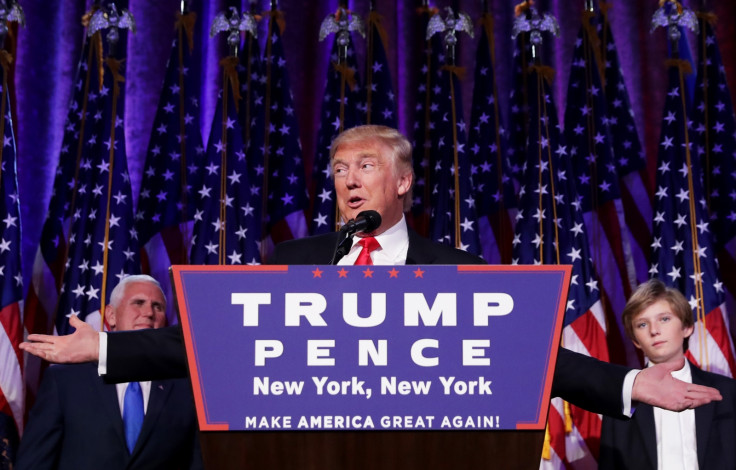Where does President Donald Trump stand on abortion - and could he overturn Roe v Wade?
Pro-abortion groups say the Republican president-elect poses a threat to women's reproductive rights.

"Nobody has more respect for women than I do," Donald Trump told supporters at the first presidential debate in September. Less than a month later, a tape emerged of him bragging about grabbing women "by the pussy" – a comment which he dismissed as "locker room" talk.
But the scandal – one of many that have mired Trump's presidential campaign – did not deter American voters from supporting the Republican candidate en masse. The 70-year-old billionaire swept to victory in a historic and astonishing night for the US, winning key battleground states despite all polls and predictions.
And with four years of a Trump presidency on the cards after the cataclysmic election result, women in the US should prepare for a shake-up in the White House. Over the past few months, women's reproductive rights have played a major part of the presidential race, with Hillary Clinton championing greater access to abortions for American women. But with the Democratic opponent defeated, where does Trump stand on abortion rights – and is Roe v Wade under threat?
The Republican president-elect has expressed a strong opposition to abortion, except in cases of rape, incest and when the mother's health is in danger. Back in March, he said women who have abortions should face some sort of legal punishment in an interview – although he backtracked on the comment after a backlash.
Trump has also threatened to remove funding for Planned Parenthood at a press conference in Florida, one of the swing states he won on election day.
"Planned Parenthood has done very good work for millions of women," he said. "But we're not going to allow and we're not going to fund, as long as you have the abortion going on at Planned Parenthood. We understand that, and I've said it loud and clear."
Yet Trump has not always been strictly pro-life, and has oscillated for and against abortions in the past. It was only when he flirted with the idea of running for the presidency in the 2012 election that his position on the issue changed.
Previously he had spoken out in favour of access to terminations. In April 1989, Trump sponsored a dinner at the Plaza Hotel in New York, which he owned at the time, in honour of the former president of the pro-choice organisation Naral. A decade later, Trump declared he was "very pro-choice" in an interview with NBC , saying he would not ban late-term abortions if he were president.
In 2015, Trump announced he was pro-life with certain exceptions – in cases of rape or incest, or when the mother's life was at risk. Later in the year, he said he would support a 20-week ban, explaining his change of heart in the first GOP debate.
"I hate the concept of abortion," he said. "What happened is friends of mine years ago were going to have a child, and it was going to be aborted. And it wasn't aborted. And that child today is a total superstar, a great, great child. And I saw that."
Trump went further in the final presidential debate in October 2016, speaking out against "partial birth abortions", which is not a medical term but rather a political one, referring to late-term terminations into a third-trimester pregnancy. Critics were quick to point out that Trump's understanding of late-term abortions might not be medically accurate, however, after he claimed "you can take the baby and rip the baby out of the womb of the mother just prior to the birth of the baby".
While calling Trump out for using scaremongering rhetoric, many pointed out that doctors won't perform the procedure at nine months. If the life of a woman or the foetus is at risk, doctors are able to induce labour or authorise an emergency caesarean – but killing the foetus on purpose is illegal.
Since 1973, safe and legal abortions have been protected by the landmark abortion rights decision Roe v Wade. But in the final presidential debate in October, Trump said the Supreme Court would "automatically" overturn Roe v Wade if he were to become president and appoint judges to the high court.
Critics say that such a change wouldn't happen quickly, and that the court previously refrained from overturning the legislation in 1992 when the chance arose. Also, Justice Anthony Kennedy joined the count to reverse a Texas law that placed strict restrictions on abortion clinics earlier this year in Whole Woman's Health v Hellerstadt.
Yet some fear Roe v Wade could be undermined if Trump supports the "Pain Capable Unborn Child Protection Act". If passed and signed into law, the act could ban later-term terminations nationally on the factually shaky basis that foetuses can feel pain at 20 weeks. A spokesperson for the American College of Obstetricians and Gynecologists has said this theory is not fact.
Pro-choice groups say the rise of Trump is alarming, not only because abortion rights may be limited but because of the stigma he is spreading.
"Reproductive rights in America are under threat. The new president may seek to restrict abortion care, and increase stigma in the process, but that will not stop women needing to access services," says Abigail Fitzgibbon, head of advocacy and campaigns at the British Pregnancy Advisory Service.
"History shows that regardless of legislative barriers, or risks to their health, women go to extraordinary lengths to end an unplanned pregnancy or a pregnancy they feel they cannot continue with. Nothing Donald Trump does or says will change that. Women and their allies must stand together to protect reproductive healthcare that women everywhere need."
© Copyright IBTimes 2025. All rights reserved.






















